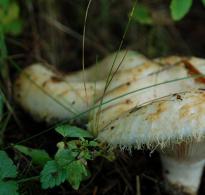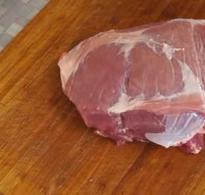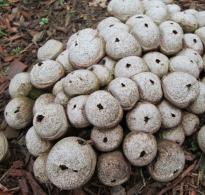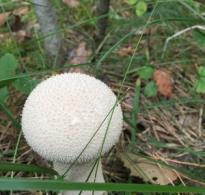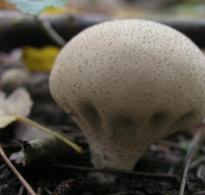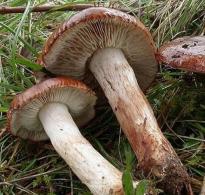Beneficial and negative properties of chuka seaweed. "Chuka" salad - seaweed that will give you a pleasant taste and health benefits
Seafood fits perfectly into a healthy human diet. They are nutritious, low in calories and have a beneficial effect on the body. Chuka salad is very popular, the benefits and harms of which are the order of the day today. Chuka lettuce belongs to the group of algae, like seaweed.
From the same category, the wild brown algae Wakame, which lives on underwater rocks, Kombu and Kaiso algae, are slightly less known. Chuka salad is prepared from these types of plants (“chuka” means “Chinese” in Japanese; it was from China that seaweed was brought to the country in large quantities).
Composition and properties of the plant
For the Japanese, such a dish is a tradition; statistics say that each resident eats more than nine kilograms of algae per year. Chuka is found in many local dishes (noodles, rolls, sushi, or simply eaten as a salad). In Japan, you can try seaweed in almost every restaurant, and in our country you can buy it frozen or as a ready-made dish in sealed vacuum packaging.
The composition of chuka salad is rich in vitamins and minerals; the calorie content of seaweed is suitable for women who want to lose weight. Nutritional value of the product per 100 g:
- Proteins - 7 g;
- Fats - 1 g;
- Carbohydrates - 17 g;
Energy value per 100 g is approximately 60 kcal. This chemical composition and energy value of chuka lettuce allows it to be used to improve the health of the body.
12 facts about the benefits of Chuka seaweed
Chuka is a real storehouse of useful substances and properties. We can talk about the benefits and harms of salad for a long time, but we value your time and have collected the top 12 most useful qualities of the product.
- It is a natural source of iodine, necessary for the normal functioning of the thyroid gland;
- Contains many vitamins - A, C, E, B, PP, K;
- Chuka is versatile in cooking and has more areas of application compared to seaweed;
- It contains a lot of plant fiber, which promotes good intestinal function and cleanses the body;
- The amount of fat in the salad is small, which puts it on the list of low-calorie dietary dishes;
- Algae are a source of many minerals (iron, calcium, potassium) necessary to regulate metabolism;
- They are rich in proteins and amino acids, which help build and strengthen muscle tissue. Well suited for use by people involved in various sports;
- Phytohormones-lignans fight cancer cells, slow down and stop their development, and reduce the risk of cancer. They also function as antioxidants, protect the body, neutralize the effects of free radicals on cells;
- Algae contains omega-3 fatty acid - a participant in many chemical processes and an assistant to the heart; Chuka salad removes toxins and waste, cleanses the blood;
- Helps improve brain function;
- Normalizes the functioning of the digestive system, is useful for some diseases of the gastrointestinal tract; Algae help strengthen the walls of blood vessels, reduce the risk of myocardial infarction;
- They bind and remove heavy metal salts and radionuclides from the body.
Chuka harm and contraindications
While listing all the advantages of algae, one cannot fail to mention their possible adverse effects on humans. It is not recommended to consume salad for people with a high iodine content in the body and thyroid diseases (possible hormonal imbalance).
Also, seaweed should not be introduced into the diet of children under twelve years of age. It is believed that some substances contained in plants can inhibit metabolic processes and contribute to water stagnation.
If a person has individual intolerance, this is another contraindication to eating salad. If an allergic reaction occurs, you should remove the product from your menu.
It should also be recalled that algae play the role of a biofilter in the ecosystem. They purify and disinfect the water in which they grow from various contaminants.  If the area where they were collected is unfavorable, the ecology is bad, and the water is stagnant, then perhaps such plants will contain a considerable amount of harmful elements, and there will be no benefit from them to the body.
If the area where they were collected is unfavorable, the ecology is bad, and the water is stagnant, then perhaps such plants will contain a considerable amount of harmful elements, and there will be no benefit from them to the body.
If you are going to buy chuka salad, you should pay attention to the following points:
- The color of the algae should be natural and pleasant. Their color is usually golden green, or may be malachite;
- The taste of the salad is neutral (compared to seaweed), more juicy, there is no pronounced smell of iodine;
- The structure is delicate and soft. If the salad is hard, tasteless and colorless, then it is of poor quality;
- If there were large pieces of ice in the package, the algae were defrosted and then re-frozen.
To protect yourself from possible disappointments, buy chuka salad only from trusted, reputable places. Then you can get maximum benefit and taste from the product without harm to your health.
Many people do not know about the benefits and harms of chuka salad, and some have never even tried this specific dish. It contains special algae, which is why it is very different in taste from the seaweed that many are familiar with.
The chemical composition of the mass differs little in its beneficial properties from its more famous analogue, and in many characteristics even leaves it behind. Thanks to its therapeutic properties and unforgettable taste, salad is a regular part of the diet of many gourmets.
Chuka salad - what is it?
Algae is the main component of chuka salad, like many other dishes that came to us from the land of the rising sun. Despite the fact that recipes and cooking options for the product can vary greatly, sea chuka always remains the basis of an exotic dish.
This ingredient grows at low depths (less than one hundred meters) near the shore. The plant can be found in countries such as Russia, China and Japan. The name of the salad is translated as “Chinese”, because the Japanese used to bring preparations from the Middle Kingdom.
Nowadays, there is a technology for freezing and drying these unusual algae, which greatly simplifies the method of transporting them and increases the shelf life of the product. The most interesting thing is that the manipulations carried out with the plant do not in any way affect its chemical composition, due to which the beneficial properties are preserved.
Centuries ago, chuka was considered a peasant food, but in the modern world it is considered a delicacy. But the good news is that this does not affect the price of the product in any way. Salad base is available to all segments of the population.
Vitamin composition and benefits for the body
The presence of mineral elements in the dish is the main secret of the salad. Algae contain vitamins A, B, C, E, D, R, which provide the body with good health. At the same time, they are presented in unusually large quantities, which other marine plants cannot boast of. Chuka is also full of proteins, amino acids, fatty acids and collagen with plant fiber.
Brown algae salad strengthens the body due to the following positive changes:
- The functioning of the vascular system and the activity of the heart muscle return to normal, and the chances of heart attacks decrease.
- The level of harmful cholesterol in the blood decreases, which improves the life of patients with atherosclerosis or prevents the disease from occurring at all.
- The digestive organs begin to function better. The volume of waste and toxins in tissues decreases. There is a normalization of the pancreas and an increase in the activity of bile secretion.
- One hundred grams of products contain less than 70 kcal, which is so important for those who want to lose weight or reduce sugar levels in the body.
- Iodine and other minerals present in algae have a positive effect on the thyroid gland.
- By regularly consuming a dietary dish, you can ensure blood purification, improvement of kidney condition and rejuvenation of the entire body.
- Athletes will also appreciate this dish. The vegetable protein in the salad is great for muscle growth after intense strength training.
- Salad stimulates the activity of the brain system, eliminates traces of diseases such as chronic fatigue, which increases the ability to focus on specific goals. This is of great benefit for children who are overworked in educational institutions and for older people suffering from senile dementia.
- After the appearance of chuka in the diet, the prostate gland returns to normal, which is so important for men.
- And women will love this product for improving blood circulation in the pelvic area and accelerating the healing of the mucous membrane after illnesses.
This is interesting! The Japanese consider making chuka salad a real art! Different provinces keep their own unique recipes and secrets. But, despite the difference in preparation methods, the benefits of the salad will not go away and will manifest themselves in the shortest possible time.
Chuka algae - natural medicine
Traditional medicine has been using marine plants for many centuries. They were most popular in Asian countries, where medicinal plants were generally available. At a time when modern medicines were unavailable, thanks to sea grass, our ancestors coped well with many ailments, such as:

By eating this natural medicine every day, you can supply your body with fluorine, manganese, zinc, silicon, iron, aluminum and other useful trace elements. With the help of these extremely important components, the full functioning of the human body is ensured.
For example, fluoride strengthens gums and tooth enamel, which provides protection against caries. The presence of a sufficient amount of molybdenum in the body helps to improve the health of connective tissues, and venous and lymphatic microcirculation is improved thanks to cobalt. The vitamins contained in chuka promote accelerated cell renewal.
Having studied the properties of these medicinal algae, you can easily find the answer to the question: why the Japanese nation is famous for its longevity.
Recipes with chuka
There are many different recipes for this dish in the world. Let's look at the most popular options.
Classic salad
Ingredients:
- 400 grams of frozen seaweed;
- one chili pod;
- 2 tablespoons sesame seeds;
- 100 grams of pickled kikurage mushrooms;
- 1 tablespoon of nut sauce;
- 100 ml. water;
- 30 ml. vegetable oil;
- 20 ml. rice vinegar;
- 1 tablespoon sugar;
- 1 teaspoon salt;
- 2 tablespoons soy sauce;
- 1 tablespoon sesame oil;
- 1 teaspoon starch.
Cooking method:
- Add salt to the water and cook the chuka, then put it in a colander and drain the broth into a separate container.
- We dilute the starch in one hundred milliliters of broth and heat until it thickens.
- Let cool.
- Dissolve salt and sugar in the broth, add oils, sauces and a tablespoon of vinegar.
- Chop the mushrooms into strips and chop the pepper into small cubes.
- Dry the sesame seeds in a frying pan without oil.
- Mix everything together and add oil if desired.
Chuka salad with onions and mushrooms
Ingredients:
- 100 grams of wakame seaweed;
- 30 ml. vegetable oil;
- 100 grams of dried kelp seaweed;
- 20 ml. vinegar;
- 2 tablespoons sesame seeds;
- one onion;
- a little salt and sugar;
- 100 grams of tree mushrooms.
Cooking method:
- Boil all the seaweed in water with salt.
- Drain the water and cool.
- Chop the onion into cubes, add salt and press a little to soften and release the juice.
- We cut the mushrooms into strips.
- At the end, mix everything and season using vinegar and oil.
Chuka salad with celery and mushrooms
Ingredients:
- 300 grams of seaweed;
- 30 ml. vegetable oil;
- 150 grams of celery root;
- a teaspoon of flour;
- one chili pepper;
- 2 tablespoons sesame seeds;
- 20 ml. wine vinegar;
- a little salt, sugar and pepper.
Cooking method:
- Place wakame seaweed in salted and acidified water and cook.
- Pour the broth into a separate container.
- In broth (100 ml) we dilute spices, vinegar, flour, chopped chili pepper and vegetable oil.
- Heat until it thickens.
- Chop the celery into strips.
- Pour the sauce over it and leave to cool.
- Remove the celery from the sauce, add seaweed and sesame seeds.
- At the end, you can add wine vinegar if desired.
You will find the recipe for chuka salad with nut sauce in the following video:
The secret of selection and storage
The quality of the product depends on the place where it grew and proper storage during transportation. If shock freezing was carried out (up to 19 degrees), then the algae will retain the necessary beneficial microelements.
In the store we pay attention to the following factors: 
- Where was the crop harvested and what is the expiration date?
- Is there snow and ice inside the package? If the answer is yes, it means the product has been thawed and re-frozen. Such raw materials can harm your health!
- What color is the product? Green color is a sign of quality. Brown dark spots are unacceptable!
- Let's look at the texture. The plant should not lie in clumps; this indicates storage problems.
Having purchased a frozen product, we store it in the freezer, the temperature of which should not exceed minus 18 degrees. After defrosting, use the chuka for four weeks. You should not freeze it again - this will lead to the death of beneficial microelements.
Who is contraindicated for chuka salad?
Before you start eating an exotic salad, you should familiarize yourself with the list of contraindications. New foods in the diet often cause allergies, but this is not the only problem:
- Do not buy products that were grown in places of dubious reputation or offered by little-known Chinese producers. The plant perfectly absorbs toxic substances from unfavorable soil.
- Iodine is contraindicated in children of the younger age group. The instability of their hormonal balance may increase.
- Consult your doctors if you have thyroid problems.
- Pregnant women are required to consult with specialists before consuming chuka lettuce. It may cause heartburn.
Chuka salad is hearty and nutritious. It can be served as a side dish or as a separate dish. It is also great as a snack. Remember, by following all the rules for storing and selecting dietary seaweed, you can safely enjoy the taste and benefits of this product!
In contact with
Seafood is simply a storehouse of useful elements and vitamins. Eating seafood is one of the many secrets of longevity, health and beauty, but not only fish, crabs, shrimp and other living creatures are called seafood.
Seaweed also are very useful and a popular ingredient, which can be eaten. Seaweed is familiar to all of us, but in stores you can find chuka salad, which is made from various types of seaweed. In this article you will learn all the information you need about this highly healthy salad!
Useful properties of chuka salad 
- Seaweed helps lower cholesterol; this is one of the most important factors in losing weight, cleansing the body of toxins and waste, as well as in the fight against atherosclerosis.
- The functioning of the cardiovascular system improves. The product restores myocardial tissue and blood vessel walls, which reduces the risk of heart attack.
- Also, due to its low calorie content, this product has gained popularity among people suffering from diabetes. Algae naturally lowers blood sugar levels, and this is one of the main beneficial factors for diabetics.
- The product also provides invaluable help and benefits to men. Chuka salad gives strength, endurance and is a prevention of prostate diseases, as well as a quite powerful natural aphrodisiac.
- Scientists have proven that chuka salad is a preventive product against the development of cancer.
- Antioxidants contained in chuka algae have a rejuvenating effect.
- Seaweed is one of the best natural nootropics, it increases mental performance, concentration and relieves fatigue.
- Chuka algae also cleanses the liver and kidneys of harmful components, which helps rejuvenate the body as a whole and improve its functioning.
- The functioning of the pancreas is normalized, as it receives a large amount of iodine, which is so abundant in seaweed. is also one of the main components of this product, so people who live in northern areas where the sun does not shine very often simply need to include seaweed in their diet.
Composition of Chuka salad
The chemical composition is the main highlight of this product, because it is thanks to this set of chemical components that chuka salad has a beneficial effect on our body.
Chuka salad contains:
Nutritional value and calorie content of chuka salad per 100 grams
- Calories: 123 kcal.
- Proteins: 2.3 g.
- Fat: 5.4 g.
- Carbohydrates: 13.2 g.
Role in dietetics and weight loss 
- Chuka algae have a fairly low calorie content, their energy value is equal to 60 kcal per 100 g of product. Of course, this property of chuka salad is very useful for women who watch their figure and want to always look young and beautiful. Based on these algae, nutritionists have developed a huge number of diets with which you can achieve very impressive results. This salad will not only relieve you of excess weight, but will also fill your body with all the necessary nutrients and vital components.
- This product has a positive effect on the entire gastrointestinal system. Helps gently cleanse the intestines of toxins, helping the pancreas to steadily secrete bile.
- Chuka salad contains high amounts of protein and protein. This product can be called a must in the diet of people involved in sports, because it is an important component for building muscle mass. Do not forget that light physical activity during a diet will only benefit you, and this product will help you emphasize your figure with stronger muscles after losing those extra pounds.
How to choose and store this product correctly
One of the main factors that you should pay attention to when choosing seaweed is its appearance. The whole secret lies in the method of freezing the algae. If the so-called shock type of freezing was used, then after it the algae does not lose its bright green color and all its beneficial properties.
They should look as if they were taken out of a sea pond just a few minutes ago. You can also tell by appearance where these algae grew. Darkening, spots of different colors, heterogeneity of the entire mass in the package should alert you.  It is advisable to refuse to purchase this product. These are signs that the algae grew in an untreated pond and is full of harmful substances that cannot be gotten rid of in any way.
It is advisable to refuse to purchase this product. These are signs that the algae grew in an untreated pond and is full of harmful substances that cannot be gotten rid of in any way.
Also, there should be no floating ice or snow flakes in the package - this indicates defrosting of the product, which was not frozen using the shock method (which should not be the case). Such a product can be dangerous to your health, so if you notice even a hint of the presence of ice in the packaging, then you should refuse to purchase.
It is best to choose chuka in transparent packaging, so you can examine its contents in more detail and evaluate the quality of the product. Store thawed chukka in the refrigerator for about a month, and frozen chuka will last even a year.
You can buy ready-made chuka salad in most supermarkets in your city; this is an excellent option for people who do not want to bother with preparing this dish and want to get the finished product right away.
But it is worth noting that preparing chuka salad yourself is not such a difficult task; you will spend only a few minutes of your time, after which you will receive the freshest product of your own preparation. For those for whom cooking is not a tedious routine, but a pleasant pastime, we have prepared a classic recipe!
Cooking time: 10-15 minutes.
Number of servings: 3-4.
Ingredients: 
- 450 g seaweed;
- 3 tablespoons fried;
- 0.5 cups;
- 2 teaspoons starch;
- 2 teaspoons;
- 0.5 glasses of water;
- 2 teaspoons lemon juice.
How to cook chuka salad
The actual preparation of the dish itself takes much less time than the time spent putting all the ingredients on the table.
- If you have frozen seaweed, you should first defrost it.
- Pour soy sauce over the seaweed and mix thoroughly until everything is soaked.
- Add sesame oil, lemon juice and starch.
- Add the sesame seeds while mixing all the ingredients so that the seeds are evenly distributed.
- Add water if necessary.
- Ready!
They eat chuka salad with whatever their heart desires; it will be appropriate for both first and second courses. And as a main course, it will be appreciated by lovers of seafood delicacies.
Contraindications for use
Do not forget that almost every product can bring you not only benefit, but also harm, and chuka salad is no exception to this rule. There are a number of contraindications in which eating seaweed is an extremely undesirable procedure. Be sure to read them before consuming this product in large quantities or applying long-term diets based on it. 
- First of all, you need to exclude the possibility of allergies caused by seaweed. If this product is an allergen for you, then you should stop using it and not torture your body.
- It is also necessary to use seaweed with extreme caution during pregnancy. In the first trimester, this product can cause heartburn, and in the last trimester, history knows cases of premature labor and delivery. Therefore, pregnant women should use this product without excessive fanaticism.
- Seaweed can cause hormonal imbalance due to its high iodine content. They should not be consumed in large quantities by children under 12 years of age.
- The same rule applies to seaweed as it does to mushrooms growing along highways or near factory areas. If algae grow in polluted waters, then they also absorb all toxins and components harmful to our body, which can cause poisoning or even death. Choose only the product of which you are confident, because not only your health, but also your life depends on it!
This wonderful product will help you cope with excess weight, carry out general strengthening prevention for your body and get a huge number of beneficial properties. Seaweed is recommended by many nutritionists around the world, because it is simply a huge vitamin bomb.
Chuka salad is a great way to diversify your diet and make following it a more enjoyable and less exhausting process for your body. Have you ever used this product to lose weight? Leave your review about eating chuka salad and tell us about the results you managed to achieve!
Residents of areas remote from seas and oceans often suffer from iodine deficiency in the body, which is harmful to health due to hormonal imbalances.
But seafood can help cope with this problem, among which Chuka algae is beginning to gain particular popularity.
Even in ancient times, the Japanese began to add only healthy foods to their diet. Chuka seaweed has become one such supplement. She is also called Hiashi Wakame or Kaiso.
In general, Wakame is the name of a brown wild algae that grows on underwater rocks along sea coasts. The Japanese appreciated it for its soft and pleasant taste and satiety with zero calorie content.
Chuka is a common ingredient in many Japanese dishes. It is added to sushi and rolls, eaten as a salad alone or with additives, and made into noodles.
The product arrives in our stores frozen. The benefits of a quick-frozen sea plant remain almost the same as those of a fresh product. Sometimes you can find ready-made salad with preservatives and seasonings, sold by weight or in sealed packages.
Useful features of chuka
Like many seafood, the benefits of eating Chuki salad are quite clear.
After all, such a delicacy is full of nutrients and vitamins:
- Chuka salad is rich in vitamins A, D, K, group B. The main feature is that it contains a large amount of iodine, which is necessary for our thyroid gland for normal hormone production. This algae also contains trace elements of potassium, calcium and iron, and is a supplier of unique amino acids and proteins. Plant fiber acts as a natural cleanser for the body.
- This sea plant is rich in natural antioxidants, which can stop the aging mechanism due to the ability to fight the effects of free radicals.
- The benefits of Chuka are further manifested in the fact that with the help of this product you can remove toxins from the body, cleanse the blood and improve the functioning of the digestive system and kidneys.
- Omega 3 fatty acids in chuka affect the cardiovascular system, reducing the likelihood of heart attacks and strokes.
- Chuka can improve your mood. Having proteins in its composition, the salad is useful during intense sports activities.
- Seaweed can help your brain function. The whole benefit is that they promote perseverance, help concentrate during monotonous work, and give energy for mental work.
How to choose a seafood delicacy: signs of a quality product
 You can purchase ready-to-eat salad in frozen or canned form.
You can purchase ready-to-eat salad in frozen or canned form.
When purchasing, adhere to the following rules:
- Pay attention to production and packaging times. This product is not subject to heat treatment, therefore, even after defrosting, expired salad can cause irreparable harm to your health.
- If the package contains a large amount of ice, and not small crystals, this should warn you of a low-quality product that has been defrosted several times.
- Pay attention to the taste of the finished salad. If Chuka is hard, there is no color and no pronounced sea flavor, then we can say that the manufacturers have violated the cooking technology. The correct product has a color from golden-green to malachite, and the taste and smell is dominated by the aroma of the sea, but it differs from what is usually characteristic of seaweed, which has a distinct smell of iodine. Chuka is softer and more tender.
Possible precautions for eating salad
Remember that, like any other food component, Chuka has its contraindications for consumption:
- This delicacy can cause harm to those diagnosed with excess iodine in the body. The use of such a product can lead to malfunctions of the thyroid gland, which disrupts hormonal levels.
- It should not be introduced into food for children under 12 years of age, as the active substances in the salad can lead to metabolic disorders in the child’s fragile body.
- At the slightest sign of an allergic reaction, stop using this product.
- Remember that algae can purify water from harmful particles, so if collected in disadvantaged areas with poor ecology or in stagnant water, they can contain large amounts of harmful microelements. Such food can only cause harm to the body.
Do you want to replenish your vitamin deficiency? Eat Chuka salad! Are you thinking of diversifying your usual diet? Eat Chuka salad! Would you like to join the centuries-old cultural traditions of Asian countries? Eat Chuka salad!
The deceptive name of Chuka salad hides not the usual greens like arugula or iceberg lettuce, but real seaweed. More precisely, mix of wild algae Kaiso, Wakame and Kombu. In terms of its organoleptic properties, this salad is much more tender and softer than the seaweed that is more familiar to us, and has a less pronounced iodine smell.
Juicy, with pleasant notes of spiciness, Chuka salad goes well with rice, buckwheat and “glass” noodles, Chinese nut sauce, shrimp, fish, chicken, avocado and vegetables, and is ideal as a side dish for rolls. It is good on its own - with finely grated daikon or vinegar dressing, hot red pepper and sesame seeds. The texture of the salad is very pleasant: moderately soft, moderately crispy and elastic.
Benefits of Chuka salad
The influence of an overseas delicacy on the human body is invaluable. Chuka contains such an abundance of vitamins, minerals and active compounds that they can replace a whole range of conventional multivitamins. Just look at what these bright emerald algae contain: calcium, potassium, manganese, copper, zinc, phosphorus, sodium, selenium, iron, iodine; vitamins C, B, E, A, PP, D and K; thiamine, choline, phytohormones, omega-3 fatty acids, amino acids, enzymes and plant fiber.
Individually, each of the elements is aimed at solving one specific problem, but together they have a powerful anti-aging effect, slow down aging and prevent the action of free radicals. Regular consumption of Chuka salad helps cleanse the kidneys and blood, restores the gastric mucosa, increases endurance and generally strengthens the immune system. In the stomach, it behaves like adsorbents, absorbing and removing waste and toxins from the body.
The functioning of the cardiovascular system is stabilized, the walls of blood vessels are strengthened, and the risk of a heart attack is reduced. Among the people who prefer Chuka salad to any other, much less of those who suffer from atherosclerosis or suffer from depression. In Japan, it is credited with the properties of a powerful sexual stimulant, and is widely used in many traditional medicine recipes.
Low calorie content ( only 58-60 kcal per 100 grams) makes Chuka salad a welcome guest in dietary diets. The almost complete absence of fat and an impressive amount of proteins - the main building material for muscles - make this seafood delicacy an indispensable product for athletes.
However, the salad is also good for those who are engaged in mental work and, due to circumstances, are forced to deal with frequent nervous strain. Chuka algae improves brain activity and restores strength, allowing you to regain concentration and perseverance.
Harm of Chuka lettuce
Chuka salad has few contraindications: individual intolerance and thyroid diseases. Like any other seafood products, lettuce contains a large amount of iodine, which can have a negative effect on the body in the event of any malfunction of the endocrine system.
For the same reason, it is not recommended to overuse Chuka salad in the diet of children under 12 years of age. An excessively active influence on metabolic processes in a fragile organism that is going through the process of formation can lead to completely unforeseen consequences. In particular, to hormonal problems or pathological stagnation of fluid in the body.
How to choose Chuka salad?
Chuka reaches the shelves of our stores mostly frozen. This storage method allows you to minimize the loss of nutrients and preserve taste. Under no circumstances buy Chuka salad from unknown producers. Algae are natural sea cleaners. If they were collected in environmentally unfavorable areas, there is a high risk that the product may contain not only useful, but also extremely dangerous elements.
When choosing a salad, you should give preference to transparent or translucent packaging, through which the contents are clearly visible. The salad must be clean, free of debris and foreign impurities. Only a small amount of clean ice crystals is allowed, which indicates correct storage conditions.
If there is a large amount of snow in the package, this means that the salad has been frozen and thawed several times. Consequently, it has lost most of all useful substances and, at best, will turn out to be useless ballast for the body. At worst, it can even cause harm. For example, lead to eating disorders or poisoning.

